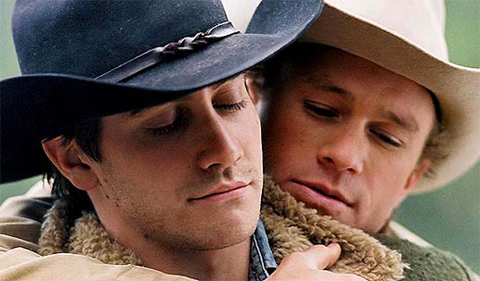
Flawless
Make no mistake: "Brokeback Mountain" isn't a gay cowboy movie or Hollywood’s latest attempt at ruining Western morality. It is, simply put, a masterful, understated work of art about the power of unrequited love.
And what power: with gorgeous cinematography, a melancholy score and no need for explanation, Ang Lee’s story of two cowboys who meet in the summer of 1963 while herding sheep and subsequently fall in love is a masterwork of sparseness that is, paradoxically, rich, textured and multi-layered. The performances by all the actors are pitch-perfect, but of course, the film belongs to Heath Ledger, whose Ennis del Mar is a revelation. With a terseness that barely contains the roiling emotion underneath, Mr. Ledger establishes the tone and never lets up. One critic claimed his performance was the "stuff of Hollywood history" and you'd better believe it.
Annie Proulx's original story is faithfully adapted here, right down to the dialogue, but even more admirable is the muted style. Jack Twist and Ennis may be doomed, but it has more to do in dealing with such conflicting emotions than a so-called "alternative lifestyle." In fact, the story and the movie’s greatest strength is playing to the ambiguities of love, rather than making a cliché argument that society kept them apart, or a tortured childhood led either man into self-loathing or despair. Instead, the premise is best summed up by the film's tag line: love is a force of nature. There are no long-winded speeches, no attempt at placing love in context. It merely exists, on its own, even if those in the crossfire don't know how to explain it to themselves.
That's a point that seems to get lost on those who find the subject matter anathema. Of course, for these individuals, they would contend that the entire issue is one of personal choice, like picking out a shirt to wear. To claim that homosexuality might just be in the "nature" of some folks is to indicate that there is something fundamentally wrong with creation, and in the telescoping biblical view they peer through, this is an indictment against God. Since we can't have this, homosexuality is a mutation of the natural order (and an instrument of the devil, for extra measure) and should be considered abnormal, a disease, or outright rebellion against the moral fabric of society. Hence, the subject matter of the film dooms it from the get go from receiving the serious analysis it deserves.
One can't ignore how natural the film flows, and it's best served by Ang Lee’s direction and pace. As mentioned, there are no grandiose (and obvious) soliloquies about intolerance or one’s civil rights. In fact, the love between Ennis and Jack and their subsequent separation that leads to unhappy marriages plays out of right of the long march of human history: men may fall in love with one another, but in the end, they marry and father children because that is what is expected of them. The sad nature of their marriages is proof for religious conservatives that homosexuality is fraught with despair and loneliness — a convenient way to ignore how traditional marriage fails in this country and how often men are absent in the raising of their children. If there were no divorce rate to speak of, and fathers nursed their sons and daughters resulting in well-balanced and content little human beings, they might have a point. But claiming that the homosexual nature of Jack and Ennis is the reason of their emotional torture is to dismiss the very mystery of what attracts one person to another. Again, neither Jack nor Ennis explains himself: they just know what they feel and that’s where the hard stuff begins. And interestingly enough, the word “gay” or "homosexual" never crosses anyone's lips, except for a terse "I'm not queer" after the first sexual encounter.
As art, "Brokeback Mountain" explodes the accepted convention of how gay people act, and that is a welcome break from the tired and lame antics of stupid characters like those on "Will & Grace" (quite possibly the worst show on television) or the irritating bitchiness of "Queer Eye for the Straight Guy." Jack and Ennis are men, and their actions, words and style have nothing to do with swishy behavior or having fine décor and track lighting. It's even wrong to claim these men are butch (or bears) since that always implies a level of role-playing. The characters in "Brokeback" read as deeply authentic: Jack and Ennis are who they are, without trying to compensate for a perceived lack of masculinity with aggression. (It is interesting to note Ennis' violent outbursts at several points in the film, even though the astonishing level of Mr. Ledger's performance will quickly demolish that contention because Ennis' temper is a part of his psyche, and not a desperate way of concealing another part of his personality.)
Even the physical encounters are handled with incredible grace, though that ultimately might owe more to peoples’ sensibilities at seeing two men have sex on screen. Yet still, it's a brilliant way of sweeping aside the notion that this is just a movie about such a thing, or about misplaced lust. The nature of the story is the complicated, unspoken emotional attachment the men develop. They may yearn for one another, but the choices they have made restrict their movements. And isn't that what the religious right is always admonishing us sinners? To accept responsibility for our choices?
Believe the hype: "Brokeback Mountain" is a brilliant work of art and a terrific love story. The moments of poetic heartbreak never pander to crass emotionalism or border exploitation. This is one for the ages.